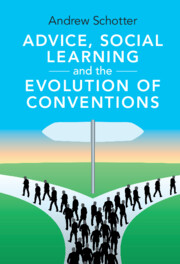
-
Select format
-
- Publisher:
- Cambridge University Press
- Publication date:
- March 2023
- March 2023
- ISBN:
- 9781009049092
- 9781316518076
- 9781009048880
- Dimensions:
- (229 x 152 mm)
- Weight & Pages:
- 0.82kg, 440 Pages
- Dimensions:
- (229 x 152 mm)
- Weight & Pages:
- 0.64kg, 440 Pages
You may already have access via personal or institutional login
Book description
As societies progress, old generations of social agents die and are replaced by new ones. This book explores what happens in this transition as the old guard instructs the new arrivals about the wisdom of their ways. Do new entrants listen and follow the advice of their elders or dismiss it? Is intergenerational advice welfare improving or can it be destructive? Does such advice enhance the stability of social conventions or disrupt it? Using the concept of an Intergenerational Game and the tools of game theory and experimental economics, this study delves into the process of social leaning created by intergenerational advice passed from generation to generation. This book presents a unique theoretical and empirical study of the dynamics of social conventions not offered elsewhere.
Reviews
‘This book is written by one of the leading scholars in Experimental Economics. Dozens of doctoral students have been supervised in the ‘Andy Schotter School of Experimental Economics’ at NYU. After graduating, they join a worldwide network that is at the forefront of research in this field. Young researchers should treat this book as ADVICE on how to pursue a fulfilling academic career in Experimental Economics.’
Ariel Rubinstein - Tel Aviv University and New York University
‘People usually communicate with others before making important choices. One form of communication is advice, particularly from trusted sources. A primary example is intergenerational advice, passed along from parents to children. Andrew Schotter is a pioneer regarding such advice in laboratory experiments. In this brilliant work, he describes how intergenerational advice plays out in a wide variety of environments. It is time for researchers to delve more deeply into this realm and this will help pave the way.’
Gary Charness - University of California, Santa Barbara
Contents
Metrics
Altmetric attention score
Full text views
Full text views help Loading metrics...
Loading metrics...
* Views captured on Cambridge Core between #date#. This data will be updated every 24 hours.
Usage data cannot currently be displayed.
Accessibility standard: Unknown
Why this information is here
This section outlines the accessibility features of this content - including support for screen readers, full keyboard navigation and high-contrast display options. This may not be relevant for you.
Accessibility Information
Accessibility compliance for the PDF of this book is currently unknown and may be updated in the future.


